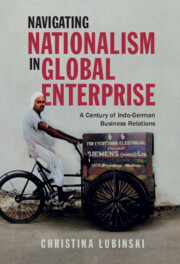Book contents
- Navigating Nationalism in Global Enterprise
- Cambridge Studies in the Emergence of Global Enterprise
- Navigating Nationalism in Global Enterprise
- Copyright page
- Dedication
- Contents
- Figures
- Tables
- Acknowledgments
- Introduction
- Part I Nationalism and Competitive Dynamics
- Part II Emergent Strategy in a World of Nations
- Conclusion: Rehistoricizing Nations
- Appendices
- Bibliography
- Index
Conclusion: Rehistoricizing Nations
Published online by Cambridge University Press: 27 October 2022
- Navigating Nationalism in Global Enterprise
- Cambridge Studies in the Emergence of Global Enterprise
- Navigating Nationalism in Global Enterprise
- Copyright page
- Dedication
- Contents
- Figures
- Tables
- Acknowledgments
- Introduction
- Part I Nationalism and Competitive Dynamics
- Part II Emergent Strategy in a World of Nations
- Conclusion: Rehistoricizing Nations
- Appendices
- Bibliography
- Index
Summary
The final chapter draws out conclusions from a century of Indo-German relations. It shows the deep limits of treating nations and nationalism simplistically as barriers to international integration. The growing interconnectedness of the world did not challenge the ideas of nationalism but rather reinvigorated it. Nationalism is not the opposite of globalization but a part of it. To better integrate nations into our understanding of international business history and strategy, this chapter shows that we need to move beyond a transactional view of international business steeped in the assumption that nationalism introduces political risks and increases transaction costs, towards a relational view in which multinationals are understood as integral players in an evolving geopolitical landscape comprised of national communities. Such a view considers how multinationals navigate two sets of relationships that characterize nations: the relationships that define the nation as an imagined community with a collective past and an aspirational future and the relationships that define the nation in relation to other nations. These relationships allow us to consider the ways in which the economics of international business are inseparable from the politics and ideology of the global economy.
Keywords
- Type
- Chapter
- Information
- Navigating Nationalism in Global EnterpriseA Century of Indo-German Business Relations, pp. 246 - 251Publisher: Cambridge University PressPrint publication year: 2022



